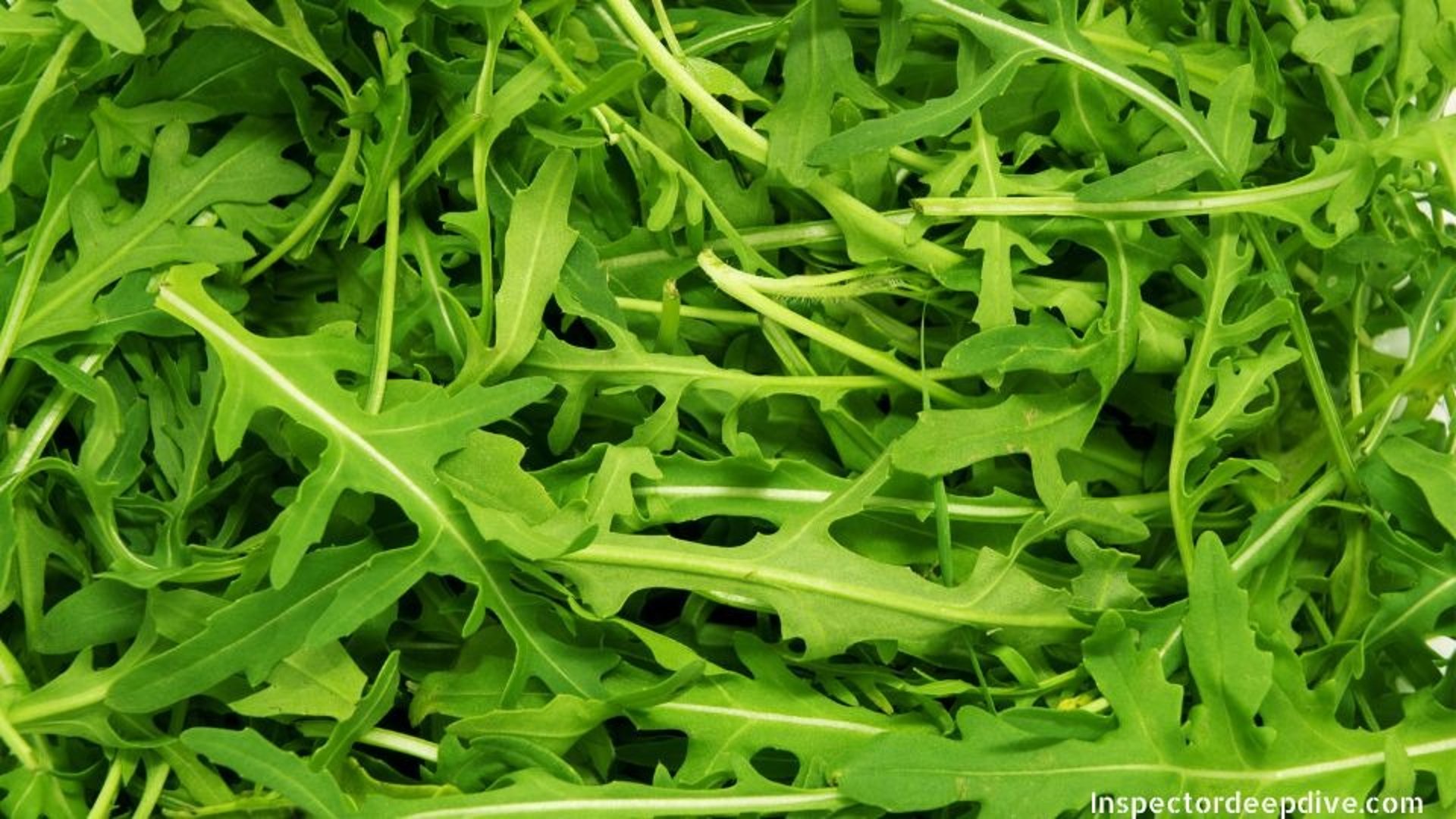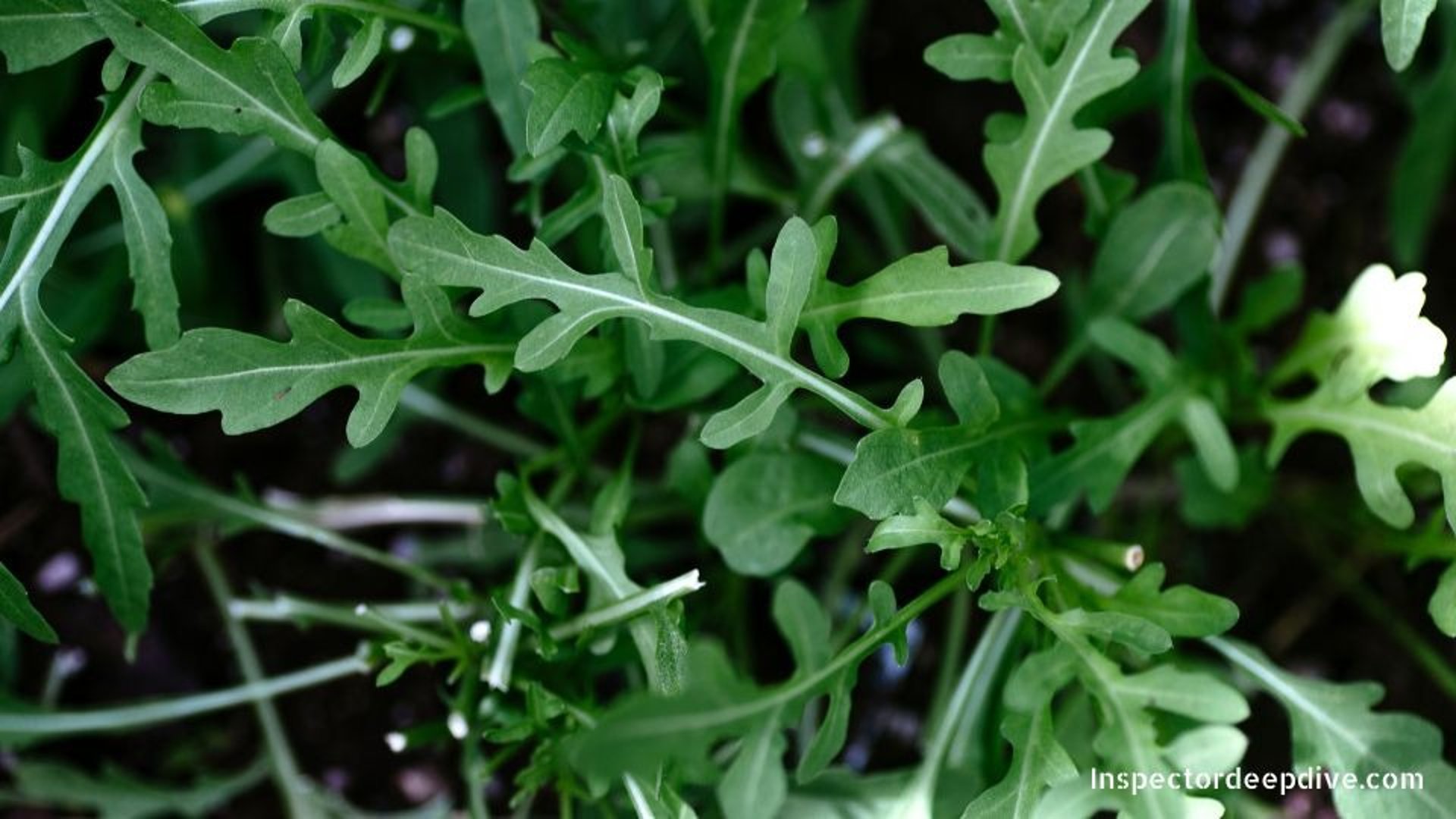
Arugula (Rocket): A Comprehensive Guide

Scientific name: Eruca vesicaria
What is arugula?
Arugula, also known as rocket, roquette, or rucola, is a leafy green vegetable belonging to the Brassicaceae (mustard) family, which also includes kale, broccoli, and cabbage. It is characterized by its distinctive peppery, slightly bitter flavor and tender leaves, making it a popular addition to salads, sandwiches, and various cooked dishes.
Origin and history
Arugula is native to the Mediterranean region, where it has been cultivated and consumed since Roman times. Historically, it was valued for both its culinary uses and its perceived medicinal properties. Today, it is grown globally, particularly in Europe, North America, and Asia.
Varieties
While there are fewer distinct "varieties" of arugula compared to other greens, common types include standard arugula (often with broader, rounder leaves) and wild arugula (with smaller, more deeply lobed leaves and a more intense, spicier flavor).
Seasonality & availability
Arugula is a cool-weather crop, typically in season during spring and fall. However, due to modern agricultural practices and greenhouse cultivation, it is widely available year-round in most grocery stores.
Benefits of Arugula
Rich in Vitamins: Excellent source of vitamins K, A, and C, supporting bone health, vision, immune function, and skin integrity.
High in Antioxidants: Contains potent antioxidants like glucosinolates, flavonoids, and carotenoids, which protect cells from oxidative stress.
Supports Bone Health: High vitamin K content is crucial for bone mineralization and strength.
Aids Digestion: Its fiber and water content promote healthy digestion and regular bowel movements.
May Regulate Blood Sugar: Low glycemic index and fiber content can help stabilize blood glucose levels.
Hydration: High water content contributes to overall hydration.
The “Anti” Factor
Anti-inflammatory: Contains glucosinolates and other phytonutrients that help reduce chronic inflammation throughout the body.
Antioxidant: Neutralizes free radicals, protecting cells and DNA from oxidative damage.
Anti-cancer: Glucosinolates convert into isothiocyanates (e.g., sulforaphane) during digestion, which are potent compounds studied for their potential to inhibit cancer cell growth and promote detoxification, particularly in colon, breast, and lung cancers.
Anti-bacterial: Exhibits mild antimicrobial properties, contributing to overall immune defense.
Anti-hypertensive: Potassium content supports healthy blood pressure regulation.
Nutritional Breakdown (per 100g raw)
Vitamins
Vitamin K: 108.6 µg (90% DV) essential for blood clotting and bone health.
Vitamin A (as Beta-carotene): 237 µg (26% DV) supports vision, immune function, and skin.
Vitamin C: 15 mg (17% DV) boosts immunity and collagen production.
Folate: 97 µg (24% DV) aids cell division and is important for DNA synthesis.
Minerals
Calcium: 160 mg (12% DV) promotes strong bones and teeth.
Potassium: 369 mg (8% DV) regulates fluid balance and supports heart health.
Magnesium: 47 mg (11% DV) involved in energy production and muscle function.
Iron: 1.46 mg (8% DV) aids oxygen transport in the blood.
Macronutrients
Calories: 25 kcal very low-calorie, nutrient-dense leafy green.
Water: 91.7 g excellent for hydration.
Protein: 2.6 g provides essential amino acids.
Total Fat: 0.7 g minimal fat content.
Carbohydrates: 3.7 g includes natural sugars and dietary fiber.
Dietary Fiber: 1.6 g promotes digestive health and satiety.
Sugars: 1.6 g naturally occurring sugars.
How Arugula Affects the Body
Cellular Protection: Arugula's high antioxidant content, particularly glucosinolates, helps protect cells from damage caused by free radicals and environmental toxins.
Detoxification Support: Isothiocyanates, derived from glucosinolates, activate detoxification enzymes in the liver, aiding the body's natural cleansing processes.
Bone Strength: The significant vitamin K content is crucial for activating proteins involved in bone mineralization, contributing to skeletal health.
Cardiovascular Health: Antioxidants and potassium support healthy blood pressure and reduce inflammation, benefiting heart function.
Digestive Wellness: Fiber and water content promote regular bowel movements and a healthy gut environment.
Risks and Cautions (Informational)
Blood Thinners: High vitamin K content may interfere with anticoagulant medications like warfarin. Individuals on such medications should maintain consistent intake and consult their healthcare provider.
Oxalates: Arugula contains oxalates, which can contribute to kidney stone formation in susceptible individuals if consumed in very large quantities.
Digestive Sensitivity: Some individuals may experience mild digestive discomfort (e.g., gas, bloating) due to its fiber content or sulfur compounds, especially when consumed raw in large amounts.
Who Should Be Cautious?
Individuals on blood-thinning medications or those with a history of kidney stones should be mindful of their arugula intake and consult a healthcare professional for personalized guidance.
Surprising Truths
Arugula's peppery flavor comes from glucosinolates, the same compounds found in other cruciferous vegetables, which are responsible for many of its health benefits.
It is one of the oldest cultivated leafy greens, with its use documented in ancient Roman texts.
Environmental Impact
Arugula is a relatively fast-growing, cool-weather crop that generally requires moderate water. When grown locally and sustainably, its environmental footprint can be low. Organic farming practices further reduce pesticide use and promote soil health.
Best Culinary Uses & Chef Tips
Raw: Best enjoyed raw in salads, as a topping for pizza, or mixed into sandwiches and wraps to preserve its delicate texture and peppery bite.
Cooked: Can be lightly sautéed, wilted into pasta dishes, or blended into pesto. Cooking mellows its peppery flavor.
Pairing: Its bold flavor pairs well with acidic dressings (lemon, vinegar), salty cheeses (Parmesan, feta), and rich proteins.
Cleaning: Rinse thoroughly under cool water to remove any grit.
Storage & Shelf Life
Store unwashed arugula in a plastic bag or airtight container lined with a paper towel in the refrigerator. It typically stays fresh for 3-5 days; use promptly for best flavor and texture.
Label Reading Tips
Look for vibrant green, crisp leaves without yellowing, wilting, or slimy spots. Organic labels ensure it's grown without synthetic pesticides.
Recipe Ideas
Arugula and Parmesan Salad with Lemon Vinaigrette
Pizza topped with fresh arugula and prosciutto
Arugula Pesto (instead of basil)
Grilled Salmon with Arugula Salad
Pasta with Wilted Arugula and Cherry Tomatoes
Science Behind It
Arugula's health benefits are largely attributed to its high concentration of glucosinolates, which are converted into biologically active isothiocyanates upon chewing and digestion. These compounds, along with flavonoids like quercetin and kaempferol, exert significant antioxidant, anti-inflammatory, and chemoprotective effects, influencing cellular pathways related to detoxification and immune response.
FAQs
Is arugula a superfood?
Arugula is highly nutrient-dense, offering a wide array of vitamins, minerals, and phytonutrients, making it a valuable component of a healthy diet.Why does arugula taste peppery?
The peppery flavor comes from glucosinolates, which are sulfur-containing compounds that release pungent notes when the plant cells are damaged.How do you keep arugula fresh?
Store unwashed arugula in a sealed bag or container with a paper towel in the refrigerator to absorb excess moisture.
Arugula (Rocket): A Comprehensive Guide
info@inspectordeepdive.com
© 2025 food.InspectorDeepDive.com. All rights reserved. Content may not be copied or republished without permission.
This article is for informational purposes only. InspectorDeepDive.com does not provide medical advice. Always consult a licensed healthcare provider before making dietary or health decisions.
